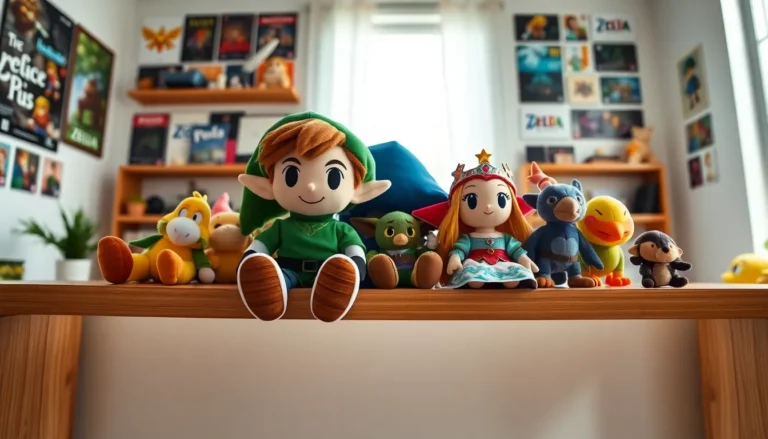Table of Contents
ToggleElden Ring is not just another entry in the soulsborne genre: it’s a treasure trove for players seeking to fine-tune their builds. One of the key features that makes or breaks characters in this vast world is attribute scaling. Understanding this intricate system can be the difference between feeling like a demigod in the Lands Between and wandering around like a lost tarnished. So, buckle up as we dive deeper into the world of attribute scaling, and you might find a few laughs along the way.
Understanding Attribute Scaling

In Elden Ring, attribute scaling refers to how effectively a weapon or piece of equipment benefits from a character’s statistics. The game rewards players for investing in specific attributes by increasing the damage or effectiveness of their weapons and armor. When an item is scaled, it essentially reacts positively under the influence of certain character stats. This means that a weapon can hit harder if it’s wielded by a character whose attributes align well with the weapon’s scaling.
For instance, using a sword that scales primarily with strength in the hands of a strength-focused character can yield devastating results. Imagine showing up to a boss fight with a flimsy dagger versus wielding a colossal greatsword that perfectly fits your build. That’s the beauty of understanding attribute scaling, it opens up a world of possibilities.
Remember, it’s not just about raw damage: it’s about synergy.
How Attribute Scaling Works
Attribute scaling operates on a tiered system in Elden Ring. Each weapon or piece of armor has a designated scaling type, usually ranging from E to S.
- E being the lowest scaling:
This means the item will hardly benefit from your character’s attributes.
- A and B represent moderate scaling:
You’ll notice a decent improvement, particularly if you’ve invested enough points.
- S is where the magic happens:
This scaling allows for maximum potential, making your character feel nearly unstoppable in battle.
Armed with this knowledge, players can make informed decisions when selecting their gear. A weapon with S scaling can significantly enhance overall performance when combined with the right character build, rendering even the toughest foes much more manageable.
Types of Attributes Affected by Scaling
Understanding which attributes are affected by scaling is essential when crafting a powerful build. Here are the primary types to consider:
Weapons and Their Scaling Attributes
Different weapons in Elden Ring scale with different attributes. For instance:
- Strength: Weapons like greatswords and colossal weapons thrive on strength scaling. The heavier the weapon, often, the more physical damage it can inflict.
- Dexterity: Agile weapons such as katanas and curved swords favor dexterity scaling, rewarding quick strikes and high damage at speed.
- Intelligence and Faith: Magic-infused weapons benefit from intelligence or faith scaling. Characters built around sorcery or incantation can deal remarkable damage using these weapons.
Armor and Attribute Scaling
While armor scaling isn’t as flashy as weapon scaling, it’s equally important.
- Some armors provide buffs that are amplified by particular attributes.
- Heavy armors may absorb more damage if the character has invested points into endurance or vitality.
In short, knowing which attributes scale with your weapons and armor can significantly affect your overall gameplay.
Determining the Best Scaling for Your Build
Finding the right scaling for your build is like finding your favorite pair of boots, the right fit makes all the difference. Here are a few strategies to consider:
Common Scaling Strategies in Elden Ring
- Strength Builds: Focus on maximizing strength scaling with heavy weapons. Invest heavily in strength, and consider using weapons like the Great Club.
- Dexterity Builds: Max out those dexterity points for swift, evasive combat. A weapon like the Bloodhound’s Fang works great here.
- Hybrid Builds: Combining attributes can allow adaptability. A character that invests in both strength and dexterity can wield a vast range of weapons effectively.
- Intelligence or Faith Builds: Investing heavily here can allow for devastating spellcasting alongside physical attacks, making magical characters infamous in Elden Ring.
Experimentation is key. Players should test different weapon builds to find what matches their play style and preferences.
Tips for Optimizing Your Build
It’s one thing to understand scaling: it’s another to fully optimize your build around it. Here are a few tips to ensure your character reaches their utmost potential:
- Test Different Weapons: Feel free to switch things up. Different weapons can respond uniquely to attribute scaling. What works for one boss may not work for another.
- Check Scaling Letters: Always pay attention to the scaling letters. They tell you how much benefit you’ll receive from your attribute investments.
- Adjust According to Playstyle: If you find a weapon that scales better with intelligence but you prefer strength, reconsider your build to create a more harmonious play experience.
- Select the Right Equipment: Don’t ignore armor and talismans. These can enhance stats and make a significant difference.
The beauty of Elden Ring lies in experimentation and exploring various builds. Each adjustment brings players closer to creating a truly personal and powerful character.




